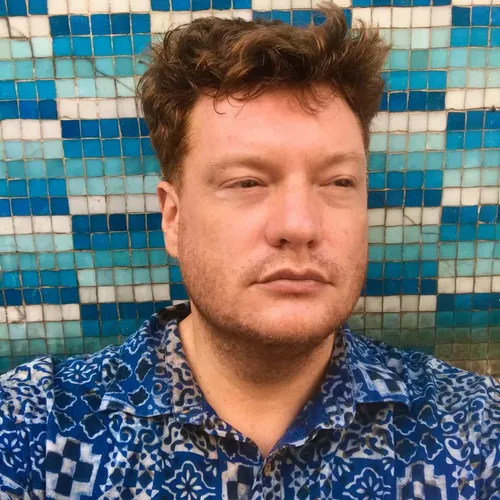
The American-Italian composer Christopher Trapani has an active career in the USA, the UK, France and Europe. Recent commissions include new works for the Klangforum Wien, the Ensemble Modern, the BBC, the JACK Quartet, and Radio France.
His music has been performed at the Carnegie Hall (New York), the Southbank Centre (London), the IRCAM (Paris) and the Wigmore Hall (London).
Born in 1980 in New Orleans (Louisiana) he is a graduate of the Harvard University and the Royal College of Music in London, where he obtained a Master's degree under Julian Anderson.
In 2003, he moved to Paris, where he spent four years in Philippe Leroux's class and as part of a residency at the Cité Internationale des Arts. After a year in Istanbul, where he was awarded a Fulbright scholarship to study microtonality in Ottoman classical music, he returned to Paris in 2008 to join the computer music program at the IRCAM, under the direction of Yan Maresz.
Since 2010 Christopher has been pursuing a doctorate at the Columbia University in New York, where he works with Tristan Murail, Georg Friedrich Haas, George Lewis, and Fred Lerdahl.
Christopher has received numerous awards: the Gaudeamus Prize for Sparrow Episodes (2007), the ASCAP's Leo Kaplan Award for Üsküdar (2009), as well as the young composers' prizes from ASCAP and BMI. He was awarded a residency in musical research at the IRCAM (2012-13), as well as artistic residencies at Les Recollets (Paris, 2013) at the Schloss Solitude (Stuttgart, 2014-15), and at the Camargo Foundation (Cassis, 2018).
In 2016-2017, he was a fellow of the Luciano Berio Rome Prize at the American Academy in Rome. In 2019 he will receive a Guggenheim Fellowship, as well as commissions from the Koussevitsky Foundation and the Fromm Foundation.
His work has appeared at festivals such as the Venice Biennale, the Festival Agora, Musica Nova of Helsinki, the Ultraschall Festival in Berlin, the Tectonics Festival in Glasgow, the Ruhtriennale, the Huddersfield and the Ravenna Festival. They are performed by ensembles such as ICTUS, L'Itinéraire Ensemble, the Nieuw Ensemble, the Talea Ensemble, Yarn/Wire and the Mosaik ensemble.
His monographic album Waterlines was released in 2018 by New Focus Recordings. A second recording of Waterlines with ICTUS was issued in 2020, and a monographic disc Horizontal Drift in 2022.
His current projects include a new piece for two voices (Sophia Burgos and Sofia Jernberg), four guitars (Zwerm), and electronics, to be premiered in 2023 and recorded for New World Records (Editor’s note : Noise Upraising, 2024).
Christopher lives between New Orleans, where he teaches digital music at the LSU (Louisiana State University), and Palermo (Sicily).
All Sounds and Images © 2025 CHRISTOPHER TRAPANI
Texte traduit du français
As musical journeys go, Noise Uprising is a unique voyage of discovery, containing plenty of surprises along the way. Drawing on Michael Denning’s book of the same name, Christopher Trapani’s aim in composing this epic 90-minute song-cycle was to cast new light on the hidden and largely forgotten histories of shellac recordings made during the late 1920s in busy port cities such as Havana, Cairo, New Orleans and Rio de Janeiro. Not only do these early recordings capture a unique sense of time and place but they also give voice to the musical forms and idioms that populated each region, from Argentinian tango and Cuban son to the Tanzanian taarab and Indonesian kroncong.
This rich profusion of styles is colourfully captured by Trapani. In addition to the source recordings, the musical foundations are provided by three members of versatile guitar quartet Zwerm (Toon Callier, Johannes Westendorp, Bruno Nelissen and Kobe Van Cauwenberghe) who, along with Trapani, combine traditional Turkish, Vietnamese and Moroccan instruments alongside standard ones such as banjo, ukulele, steel guitar and zither. An additional layer is provided through unconventional, customised instruments including a homemade omnichord, a Telecaster electric guitar fitted with microtonal frets, and a bowing device called the Gizmotron.
Sometimes the accompaniment is subtle, as in the ambient-sounding, sun-drenched ‘Jakarta (Kroncong)’ and dreamy ‘Honolulu’, or the floating opening to ‘Bombay (Alap)’. At other times, such as in ‘Piraeus II (Rebetika)’ and the dystopian-sounding ‘Smyrna (Manes)’, the quartet’s industrial, mechanised clanging resembles a crazy steampunk contraption from a futuristic sci-fi novel.
As might be expected in a song-cycle, the voice takes centre stage, and Noise Uprising benefits from the contribution of two exceptional singers in Sophia Burgos and Sofia Jernberg. Burgos’s fragile melody in the Skip James-inspired ‘Clarksdale (Blues)’ is weighed down with restrained emotion and loss, before the music shifts effortlessly to ‘Seville (Flamenco)’ featuring the extraordinary vocal prowess of Jernberg. It is testimony to the talents of both singers that they manage to imbue each song with a particular character and identity without ever resorting to ersatz ethnomusicological mannerism or cliché.
The ethnomusicological landscape may have changed radically since the early years of the 20th century, when folk-song collectors would embark on field trips in far-flung regions, but it’s possible to see Trapani as a latter-day, postmodernist Bartók, repurposing his sources to creative and imaginative ends and, in doing so, changing and challenging the musical landscape of his own day.
@Gramophone